Way Too Indie’s Top 20 Albums of 2013

Yeezus. Reflektor. Random Access Memories. mbv. If you feel like you’ve heard these names far too often recently, you’re probably not alone. These seemingly ubiquitous names have appeared towards the top of many “Best Albums of 2013” lists, but many, if not all of them, rank so highly only due to critical hype. Way Too Indie’s Top 20 Albums of 2013 list cuts through critical buzz and picks out twenty thoroughly enjoyable, moving, infinitely replayable albums released this year…well, somewhat. Even after clearing the critical fog, frequent picks Settle, Days Are Gone, Modern Vampires of the City, and The Bones of What You Believe remained compelling enough to place on this list. Despite the appearance of these albums, there should be some surprises that lie ahead, some wonderful albums that went relatively unappreciated this year. Let’s begin.
Also check out our Top 20 Songs of 2013
Way Too Indie’s Top 20 Albums of 2013
#20 – Moderat: II

The dreary nature of II is best observed on tracks such as “Versions” and “Ilona,” movingly dark pieces that affect with each synthetic spike. Of course, Moderat is somewhat aware that this formulation will eventually turn stale if repeated to precision on each track, so they occasionally invite in a guest vocalist to mildly brighten the mood. The flicker of hope in the vocals of tracks “Damage Done” and “Bad Kingdom” ever so slightly disguise the thoroughly desolate instrumentals below them.
More vocal bits might have helped Moderat craft a better album, actually. Only four songs contain guest vocals, and, although each of the remaining tracks is perfectly enjoyable, it can be easy to confuse one with the other (“Therapy” and “This Time” are almost interchangeable). Luckily, Moderat seems to understand the similarities running through their songs, as evidenced by their decision to stick the brilliant ten minutes of “Milk” close to its center. “Milk” is the track that transforms II from a great album to an excellent one. Its repeated synths fluctuate in and out of focus, and the clicking drums haunt just as thoroughly as the thinly veiled vocal samples comprising the song’s perimeter. It’s mildly more upbeat than the rest of the album, striking a balance with its thorough darkness; this balance allows II to succeed in spite of its notable flaws.
#19 – Saint Pepsi: Hit Vibes
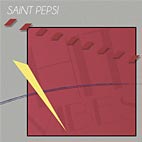
Indeed, DeRobertis is a pretty funny guy. Check out the dialogue that begins the album: opener “Hit Vibes” starts with a seemingly arbitrary bit of dialogue before spending just under a minute fleshing out a brazenly funk-indebted track. The next track, “Have Faith,” boldly announces, “It’s Saint Pepsi, bitch!” and then releases a slew of mid-70s dance sounds, as though the first track weren’t already fully devoted to this era.
Really, Hit Vibes is a modern take on the disco and funk themes of 70s music. Album highlight “Better” mixes brass and bass to maximize the level of retro-worship, resulting in a fast-paced dance anthem; “Skylar Spence” is as outright an embrace of funk as is the much-better known Daft Punk song “Fragments of Time”; “Together” echoes the era’s slow jams, embellishing the music with soul influences to fully achieve this effect. Even when Saint Pepsi includes more modern sounds, he sounds like the past: although the heavily processed vocals on “Strawberry Lemonade” are altered to fit the tradition of instrumental hip-hop, the instrumentation belongs to, again, the 70s. Forget being a champion of the internet in 2013; Saint Pepsi is happily anchored forty years in the past.
#18 – Boxed Wine: Cheap, Fun

This group’s upbeat, foot-shuffling sound echoes Matt & Kim, albeit with a greater polish. For a band with such limited resources and exposure, “First Time” features a surprisingly professional sheen, enhancing the already ecstatic themes of the music. Indeed, Boxed Wine writes songs that border on dangerously high-key; if they keep at it, their presence in the world of music may match that in their songs.
#17 – Jagwar Ma: Howlin’
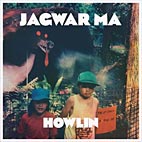
In theory, the description of Jagwar Ma’s style reads like that of so many other groups, yet the band’s success lies in their unparalleled exuberance. These three simply sound happy to be making music, and their delight is infectious. Even on songs as lyrically upsetting (although commonplace) as “Man I Need”, Jagwar Ma threaten to fully absorb listeners with their hookiness. But nowhere do they compel as greatly as on third track “The Throw”, which thrusts forward over seven unforgettable minutes. It’s an early statement of Jagwar Ma’s greatest powers; the rest of Howlin’ follows in suit.
#16 – Mister Lies: Mowgli
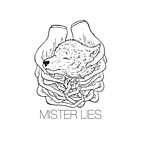
Opener “Ashore”, a thinly dim affair, starts Mowgli unassumingly, but by the arrival of third track “Align”, clearly the most house-influenced track here, it’s no longer plausible to apply the word “tiny” to this album. “Lupine” continues the ice of past tracks, its paranoid synth screeches accentuating the subdued horror; the Exitmusic-featuring “Hounded” cries soulfully, its ethereal vocals providing a disconcerting yet gorgeous contrast to the cold instrumentation. A generally dismal work of art indeed, Mowgli‘s bare nature enchants from its opening moments rather than merely emulating its predecessors.
#15 – Glasser: Interiors

Yet even though the actual sounds heard on Interiors skillfully balance dread and beauty, nothing on this album is particularly new. Interiors inevitably draws comparison to Björk’s music because, well, it sounds exactly like the space between Homogenic and Vespertine, two of the Icelandic goddess’ best works. Whereas many musicians might bore by so transparently emulating their idols, Mesirow instead so boldly wears her influences on her sleeve that her gorgeous songs never get lost in pure reverence.
For instance, the frozen synths and flickering percussion opening “Design” provide a thrilling segway into an even more chilling track; the minimalist opening notes of “Exposure” allow its huge chorus to blindside listeners, sweeping them with emotion; the short segments of “Forge” that consist only of Mesirow’s singing are nothing short of harrowing. Glasser excites without truly innnovating: although Interiors exists in the shadow of its progenitor, it sparkles gorgeously.
#14 – Boards of Canada: Tomorrow’s Harvest
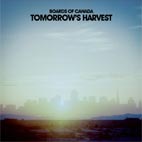
The dreariness of first track “Gemini” sweeps into “Reach for the Dead”, a bleak picture of desolation; the emptiness continues over the entirety of Tomorrow’s Harvest, each track adding more to the theme. Indeed, Boards of Canada haven’t lost their talent for extending an idea across a whole album; in fact, moreso than ever before, they’ve released a work that, in its hour-long runtime, conveys one mood so precisely. Although a couple of standout tracks do exist (“Jacquard Causeway” and “Nothing Is Real”), Tomorrow’s Harvest succeeds wonderfully as the sum of all its parts.
#13 – AlunaGeorge: Body Music
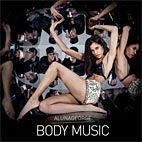
Generally, AlunaGeorge’s music is “future soul”: Francis’ delicate croon permeates warbled electronic beats, delivering what could be mistaken for 90s radio R&B sent to the 2030s for plastic surgery. Francis and Reid explore the more aggressive side of this style with upbeat, radio-ready tracks such as “Attracting Flies” and “Superstar”: exuding typical pop song structure, these tracks wouldn’t sound horrendously out of place on commercial radio if not for their futuristic, atypical synths. Elsewhere, the music exudes sensuality and intimacy: “Outlines” and “Your Drums, Your Love” soften the heavy blow of Body Music‘s many in-your-face pop tracks, delivering sensitive love tunes with familiar themes.
If anything, Body Music only falters for how familiar it feels. Even on this album’s best tracks, formulaic approaches can be pinpointed. For example, “Kaleidoscope Love” changes key for its final chorus, a technique that might come off cheesy if this duo weren’t so damn good. Lyrically, it’s firmly precedented: themes of love and lust are no fresher than a McDonald’s salad. Sure, Body Music have flaws, but AlunaGeorge are excellent architects of sound, and it’s tough not to enjoy their music, even with its faults.
#12 – Phoenix: Bankrupt

It’s not like Phoenix have never focused on synths before. “1901”, their best-known song, backs its verses with absolutely monstrous keyboards; however, for its incredibly distinct, catchy chorus, guitars lead the charge. On Bankrupt!, though, the synths control everything. The album’s most cathartic moments — the rushing post-chorus of “Entertainment”, the bright flourishes of “S.O.S. in Bel Air”, the mid-song transition in “Drakkar Noir” — ever so slightly elevate the synths above the guitars, to the point where distinguishing the two proves somewhat challenging. The increase in synthetic elements dictates the sound of Bankrupt!, which isn’t as outrightly sunny as the bright-skies-over-everything Wolfgang Amadeus Phoenix. Not to fret, though; the glory days of upbeat, positively exuberant Phoenix are not yet over. For now, though, they’re disguised by somewhat darker shades, an exciting switch-up from a band so well-respected for their skyward enthusiasm.
#11 – Disclosure: Settle
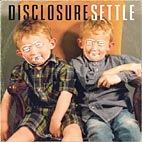
Truth be told, the fourteen tracks on Settle can be difficult to power through in one sitting, but the album’s saving grace is how enthralling each track is on its own. “F For You” is a front-foot-forward, handclap-driven jam that’s relatively low-key for something that bumps so heavily. “White Noise” broadcasts the precious voice of Aluna Francis (yes, the same one from AlunaGeorge) and berserk clicks of icy synths. “Stimulation” pounds forward on giant percussion, thick, computer-generated murk, and sampled vocal snippets. “You & Me” fuses Eliza Doolittle’s soulful, pleading voice with percussive shuffle and moody yet quick synths. “Confess to Me”, perhaps the most exciting of all the guest-featuring tracks here, uses Jessie Ware’s breathy vocals to great effect, establishing a longing ache in the verses before exploding into dancefloor mania in its chorus.
Amongst all the guest features and straightforward compositional techniques, the tracks on Settle hit surprisingly hard. There’s not a weak track to be found here, and each song has a moody underbelly hidden beneath the dancing drums and high-paced synth attacks. What a deceiving name for an album: on their debut, Disclosure’s fire never Settles.
#10 – Baths: Obsidian

It’s ultimately tragic that Wiesenfeld’s despair makes for such chilling music. Wiesenfeld discusses his absolute lack of respect for his current live-in boyfriend on “Incompatible”, a hapless situation indeed, yet the bare instrumentation and harrowing percussive click of the chorus inevitably strikes an emotional chord. It’s even easier to resonate with the statement that initiates the comedown from the chorus: “You don’t do anything with your life/fascinating, terrible, your stupid idling mind/I could prod your hurt all night.” Although the particular situations Wiesenfeld finds himself in may not be commonplace, his sentiments ring home.
Further compounding the themes of “Incompatible” is “No Eyes”, perhaps Obsidian‘s best instance of giving equal emotional weight to the music and the lyrics. A desperate tale of loveless sex, it bravely commands, “come and fuck me!” during its quavering, uneasy chorus. The lyrics are as uncomfortable as the instrumentation, which feels glaringly obvious during the disturbing, minimal interlude following the second chorus. Barely a synth tone flickers in unison with some sort of metal objects making contact in the distance, until a massive, unexpected, three-second glitch burst disrupts the quiet. Or, rather, it disrupts the disquiet; on Obsidian, the two are equal. When the darkness of the lyrics and the music are also equal, which occurs frequently and alarmingly, Obsidian succeeds as a bold statement from an artist who, despite finding his place musically, still has many more issues to sort out.
#9 – Fuck Buttons: Slow Focus

Naturally, Fuck Buttons being Fuck Buttons, Slow Focus doesn’t eliminate its rave and noise precedents entirely. Lead single “The Red Wing” closely approaches the transcendent, sky-reaching roar of Tarot Sport, although final track “Hidden XS” does so even more obviously. However, the twosome’s newfound horror-house sound makes for intense listening over this album’s seven, mostly-longer-than-six-minute tracks, even when the music approaches the Buttons’ prior optimism.
No, these guys conscious decision to restrict the soaring brightness of past works does not bore. In fact, moreso than ever, the music is driving and forceful; rarely over the course of these lengthy songs does the weight of the album fail to demand attention. Fearsome though it is, Slow Focus enthralls throughout its fifty-two minutes, and is one of the year’s best instrumental experiments.
#8 – The Virgins: Strike Gently
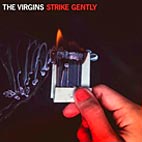
There’s a retrospective haze clouding Strike Gently‘s instrumentation, manifesting particularly strongly in its guitars and vocals. Many other acts have attempted similar styles and felt forced rather than natural, but The Virgins approach past sounds wonderfully (although these past sounds belong to other artists and not themselves — no “Rich Girls” will be found here). The relatively soft, almost-ballad “Figure on the Ice” instantly brings to mind the sparkle of 70s high school proms and the associated slow dancing, but never sounds cheesy; “Wheel of Fortune” takes on a comically lackadaisical vocal attitude to emulate the personality of the era’s performers, resulting in a wonderfully moving composition; “What Good is Moonlight” extends the band’s retro-reverence into quasi-arena rock, and is the album’s most outrightly fun number.
In the interspace between these tracks lies “Flashbacks, Memories, and Dreams”, the track that best demonstrates how The Virgins’ backwards-looking approach succeeds when it could so easily fail. It’s tough not to at least crack a smile when first hearing the tone the song’s vocal takes, although the glam guitars opening the song are already amusing enough. “I think that cool kid broke my jaw!” begins the second verse, a line that instantly recalls the glory days of the Brat Pack. “Flashbacks” takes a striking pose, although it does so gently, clinching the album’s mission statement.
#7 – Savages: Silence Yourself
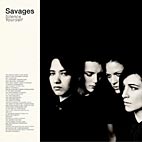
A rolling, ominous bassline tends to dominate the direction of these tracks’ verses, with stadium-sized guitars overtaking the choruses. Even when massive distortion rips these songs open, the guitars somehow manage to recede into the background by the arrival of the first verse, giving priority to the bass. “I Am Here”, “City’s Full”, “Strife”, and “She Will” all use this exact same approach. Rather than cursing the songs with staleness, though, this formula enthralls. Perhaps, though, this success is only due to the saving grace that is the Siouxsie-esque voice of vocalist Jehnny Beth. Equally capable of both breathy pleading and unhinged terror, Beth’s distinct voice empowers Savages with an absolutely undeniable force.
Although the fear induced by Beth’s voice holds the key to “She Will”‘s riotous, triumphant outro, the comfort it induces on tracks like “Marshal Dear” also deserves a mention. Ending the album, this track stands alone from the rest: rather than just post-punk instrumentation, it also brings pianos and what might be horns into the mix. It boldly states just how flexible Beth’s voice is, and makes it clear that, despite how gigantic the rest of the band sounds, this element is what drives the band to such great heights so early in their career.
#6 – CHVRCHES: The Bones of What You Believe
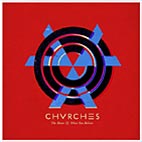
“We Sink” follows “The Mother We Share”, and further hints at the vast, skyward sounds the album will achieve. “I’ll be a thorn at your side/’til you die/I’ll be a thorn at your side/for always” coos Lauren Mayberry during the chorus, and these lyrics stick not due to their sentiments, but rather due to the impact of their surrounding synths. Like “We Sink”, “Lies” and “Recover”, probably the two best tracks on the album, also burn lyrically due to the instrumentation enveloping the words rather than their inherent meaning. On the former track, “I can sell you lies!/You can’t get enough!” scalds listeners rather than just passing them by as some sort of love-lost metaphor; the much more transparent “and if I recover/will you be my comfort?/or it can be over/and we can just leave it here” feels important and desperate when wrapped in the latter track’s humongous, optimistic synths.
There’s a definite relation between composition and lyricism in CHVRCHES music’, and it’s the interplay between the two that makes The Bones of What You Believe such an enjoyable listen. “I am gonna come for you/with all that I have,” threatens Mayberry during the first verse of third track “Gun”‘s chorus, and it’s a good summary of what CHVRCHES do best. Using all their possible instrumental and verbal talent, CHVRCHES have brewed an incredibly potent album, one whose unrestricted buoyancy provides an incredible, addicting release each and every time.
#5 – Haim: Days Are Gone

Take the title track, for instance: the subdued, bluesy guitars recall Fleetwood Mac (really, everything this band does recalls Fleetwood Mac, but just roll with this example), while the pleading vocals of the chorus might not sound terribly out of place in a 90s R&B jam. Elsewhere, “My Song 5” advances on both computerized arena rock percussive stomp and similarly thick, bluesy guitars, and “If I Could Change Your Mind” employs Danielle Haim’s soul crooning in combination with affecting guitar flicker. Haim thrills by fusing their influences with tradition, a surprisingly valid approach.
Perhaps the best example of how Haim boldly balance admiration for the classics with modern pop structures is their best known song, “The Wire.” Opening on a power chord and an arena rock drum pattern straight out of a Billy Squier tune, the song quickly rolls into a verse dominated by palm-muted guitar riffing, fluid but subtle bass, and deep, breathy vocals courtesy of Danielle Haim. Its chorus sparkles only mildly in comparison to the verses, yet it sounds impossibly larger than the verses surrounding it. After the first chorus, the song plays a trick on unfocused listeners: Danielle hands lead vocal duties to her younger sister Alana for the first half of the verse, and then to older sister Este for the verse’s second half. Each sister’s voice bears a notable amount of soul and attitude; confidence appears to be a genetic trait, as does infectious pop songwriting.
#4 – Yeah Yeah Yeahs: Mosquito
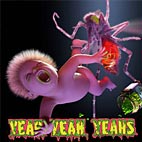
Very few other bands, if any, could make such an indecisive album a success; really, the Yeah Yeah Yeahs are getting away with murder. But this trio have a certain magic to their songwriting regardless of what shape it takes: the brutally tenuous “Subway” stings just as harshly as does its following track, the searing, frivolous “Mosquito.” The latter track contains one of the most useless, outrightly stupid sets of lyrics to ever appear in this band’s catalog (and this is coming from a band responsible for the words of “Black Tongue”); rather than bringing this song down, though, its simplicity lets the bonkers instrumentation shine. It’s a similar approach to some of the music on M.I.A.’s Matangi: let’s make the music thrilling enough for the possibly vapid lyrics to take second fiddle.
Of course, this approach is bound to fail at some point, as it does on the inane, worthless “Buried Alive.” But when you’ve also got lyrics as gorgeous and affecting as “Despair”, “Subway”, and “Sacrilege”, it’s easy to forgive the occasional slip-up. These songs all encompass dramatically different musical palettes, yet each burns with longing and passion. The victories on this album completely negate its weaker moments, and although Mosquito is no Show Your Bones or It’s Blitz (really, how many other bands write near-perfect albums in two distinct genres?), it’s still just as potent.
#3 – Foxygen: We Are the 21st Century Ambassadors of Peace and Magic
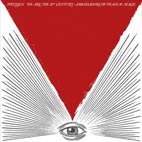
Take “No Destruction” as an example of how Foxygen distinguish their art from that of their musical parents’. The lightweight, giddy sound achieved here settles in some unexplored gap between The Rolling Stones and The Velvet Underground, fleshing out this space with Sam France’s narrative storytelling. His voice varies from half-assed and uninspired to borderline broken (this latter state mimics Mick Jagger to near perfection), and the fusion of barely overdriven guitars and faint pianos recall the late 60s all too well. Of course, it’s impossible to discuss this song without mentioning the stellar jab, “There’s no need to be an asshole/You’re not in Brooklyn anymore”; France’s wicked, characteristic sense of humor pervades his words and their delivery constantly on Ambassadors, and “No Destruction” is only the duo’s most notorious example.
The precious way France sings the opening lyrics of “San Francisco” is bound to incite at least a chuckle from the attentive listener, as is the chorus: “I left my love in San Francisco” is followed by a high-pitched, distantly mocking “That’s okay, I was born in L.A.” Oddly laughable lyrics outline “Shuggie” as well: “I met your daughter the other day/well, that was weird/She had rhinoceros-shaped earrings in her ears,” France sing-speaks as nonchalantly as the surrounding guitars and strings slump forward. The lyricism originates from predecessor Lou Reed, whose recent passing makes his influence on this album even more apparent than it already was. Indeed, even when employing their own unique sense of humor, Foxygen recalls prior greats; their backwards gaze provides an amazing template for the success of Ambassadors, an album that’s simultaneously clever and trifling, and as reverent as it is irreverent.
#2 – Vampire Weekend: Modern Vampires of the City
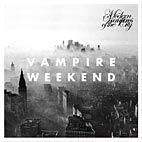
From the opening moments of “Obvious Bicycle”, it’s evident that Modern Vampires of the City is far more restricted in its dynamics than past albums…well, for the most part. “Diane Young”, “Finger Back”, and “Worship You” are boisterous, energetic standouts that show the band hasn’t entirely left their frenzied, wild past, and while these tracks all strike as diligently as the rest of the album, it’s the stark, depressing tracks that chill most strongly. “Unbelievers” contains Vampire Weekend’s signature instrumental flourishes, although they’re far more moderate than ever before. The intertwinement of the track’s organ-esque keyboards (I saw them live, I can assure you it’s not a real organ) and pushing percussion screams Vampire Weekend, yet these parts sound far bleaker than ever before, and thus more afflicting.
“Step”, “Everlasting Arms”, and “Ya Hey” also flourish on this same trick: these songs don’t sound like any other band could have created them, yet their darkness is newfound for this foursome, and their tone startlingly resonant coming from a band who once sang about Decembers spent looking psychotic in a balaclava. In general, the songs on this album are undeniably evocative and bone-chilling, but it’s impossible to discuss MVOTC without mentioning the brutal, heart-shattering “Hannah Hunt.” Critics and fans alike agree that this song is the best Vampire Weekend has yet released; from the opening whir of washed-out bass and faded human chatter, it’s instantly clear that something greater is at work here. Almost three minutes in, a cathartic, emotionally destructive climax emerges, fulfilling the song’s disquieting tension with a tragic, painful swell of pianos and Ezra Koenig’s aching, pleading vocals.
Throughout Modern Vampires of the City, one might be as likely to cry as to jump in excitement. Although it sounds soft when compared to past work, it strikes a blow so massive that it makes this band’s already excellent previous work seem like child’s play. Even if this album doesn’t feel right at first, give it a few more listens; if you have a heart, the human core of this album will eventually overtake you, and you’ll never look back.
#1 – Youth Lagoon: Wondrous Bughouse

Turning a deaf ear to such soaring guitar fills as the ones driving “Mute”, “Attic Doctor”, and “Pelican Man” must take some sort of supernatural skill. As devastating as they are kooky, the sounds on Wondrous Bughouse might at first feel confusing and trifling, but Powers’ mental troubles are entangled with his compositions. When faced with the prospect of losing someone he cares about, he writes “Dropla”, driven by its doubtful claims of “you’ll never die” and its nostalgic sentiment. “Raspberry Cane” also contains the repetition of a straightforward statement likely not believed by its speaker: “Everybody cares,” Powers tries to reassure himself, only to quickly admit, “They say love exists/but what happened to it?” The bare instrumentation surrounding these thoughts soon ascends into a hallucinogenic, childlike array of alien-sounding synths that’s oddly irresistible.
In general, the songs on Wondrous Bughouse are trippy and juvenile, but it’s this very description that also accounts for how striking they are. On “Attic Doctor”, for example, Powers introduces haunted mansion synths and MGMT-like psychedelic gait, a bit funny in their silliness, but also deeply keen and acute. “Third Dystopia” is trapped underwater, but its affecting guitars and longing chorus thrill and invigorate. “Sleep Paralysis” actually sounds like a dream for a while, but when it picks up the pace, it truly sounds like a nightmare.
Naturally, the inane basis of these songs’ instrumentation can be easily perceived as rubbish; its oddball, off-kilter tone isn’t for everyone. For listeners able to connect to Powers’ eerie songwriting, though, Wondrous Bughouse is a thrilling ride, often fun in its instrumentation, but always depraved in its sentiments. A psychedelic playground, but only for those willing to spend some time on the monkey bars.
